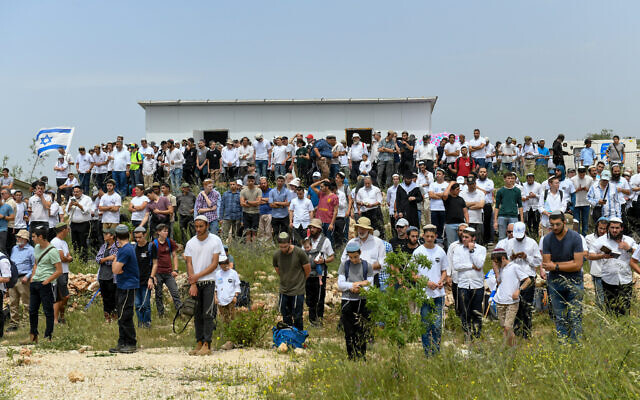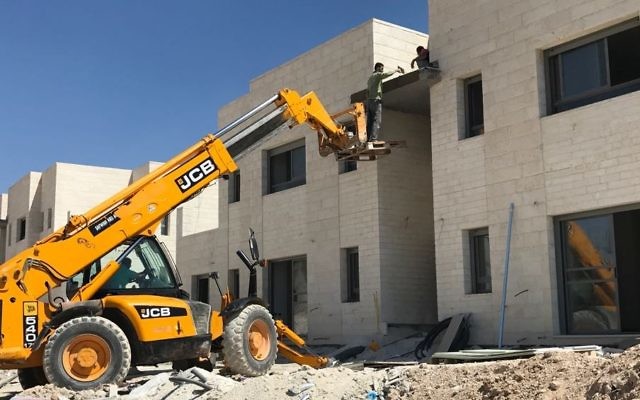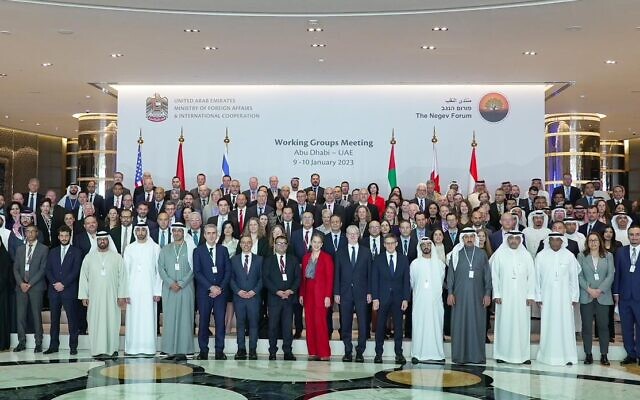‘An obstacle to peace’: US lambasts Israeli moves to expand West Bank settlements
State Department issues swift condemnation after Jerusalem announces it’ll green-light 4,500 settlement units, hand Smotrich more control over settlement policy
Jacob Magid is The Times of Israel's US bureau chief

The US State Department said Sunday that it was “deeply troubled” by a pair of Israeli moves aimed at significantly advancing settlement construction in the West Bank, which Washington branded as an “obstacle to peace.”
The Biden administration has long criticized Israel over its policies in the West Bank, but the decision to release a statement over the weekend, rather than waiting until the issue is raised at a press briefing during the week, indicated a heightened sense of frustration in Washington, which has warned Jerusalem that such steps significantly complicate US efforts to advance issues of mutual concern such as a normalization agreement with Saudi Arabia.
Earlier in the day, Finance Minister Bezalel Smotrich announced that the Defense Ministry body in charge of authorizing settlement construction had released its agenda for meetings next week where it will advance plans for 4,560 new settlement homes. A majority of the units will be located in Jewish communities located deep in the West Bank, east of the security barrier in what will further complicate efforts to create a contiguous, viable Palestinian state.
Hours later, the government passed a controversial resolution that gives practically all control over planning approval for construction in West Bank settlements to Smotrich, a settler himself and an impassioned advocate of the nationalist movement.
The decision approved at Sunday morning’s cabinet meeting, which takes immediate effect, also dramatically expedites and eases the process for expanding existing West Bank settlements and retroactively legalizing some illegal outposts.
According to the resolution, which is an amendment to a 1996 government decision, the numerous stages of authorization hitherto needed from the defense minister for the approval of land usage designation masterplans will be reduced to just one required approval.

And, in line with a previous agreement, that approval will now come from Smotrich in his secondary role as a minister within the Defense Ministry in charge of settlement affairs.
Prime Minister Benjamin Netanyahu increasingly speaks of Israel’s historic right to West Bank territory and is also seeking to appease his more nationalist coalition partners after stalling the government’s effort to overhaul the judiciary. He is ostensibly hoping that the US will suffice with statements of condemnation, while continuing to try and broker an Israel-Saudi Arabia normalization agreement, given that it would also be a major foreign policy victory for US President Joe Biden.
However, such moves still stress Israel’s already tense relationships with Jordan, Egypt and the Palestinian Authority, which it relies on for maintaining a degree of stability beyond the Green Line. Israel’s newer Arab allies the United Arab Emirates, Bahrain and Morocco have been less animated in their criticism of settlement policy in comparison to what they see as inflammatory moves by the Netanyahu government in Jerusalem, but West Bank tensions are still seen as an irritant to further warming Israel’s ties to the Arab world.
In a statement responding to the pair of Sunday developments that was issued before most Israelis had woken up on Monday, the State Department said the US “is deeply troubled” by the decision to green-light additional settlement homes and is “similarly concerned” by the subsequent resolution passed by the cabinet.
“As has been longstanding policy, the US opposes such unilateral actions that make a two-state solution more difficult to achieve and are an obstacle to peace,” the statement continued.
“We call on the Government of Israel to fulfill the commitments it made in Aqaba, Jordan and Sharm El Sheikh, Egypt and return to dialogue aimed at de-escalation,” the State Department added.
At the Aqaba and Sharm el Sheikh meetings, Israeli and Palestinian representatives committed to taking steps to calm tensions amid intensifying violence in the West Bank. Jerusalem specifically agreed to hold off on advancing plans for new settlement homes for four months and to not legalize any new outposts for six months.
While the international community considers all settlements illegal, Israel differentiates between settlement homes built and permitted by the Defense Ministry on land owned by the state, and illegal outposts built without necessary permits, often on private Palestinian land.

Next week’s Defense Ministry meeting to advance new construction will come just as the four-month moratorium expires. Just before it began, Israel green-lit a record high of 10,000 settlement homes in addition to legalizing at least nine outposts.
Israel argues that it technically has not violated the commitments it made in Aqaba and Sharm el-Sheikh, but it has green-lit construction in East Jerusalem and also illegally transferred a yeshiva in the northern West Bank, in what will make way for the legalization of the Homesh outpost.
The PA announced Monday that in response to the pair of Israeli decisions, it would be boycotting a meeting between Israeli and Palestinian finance officials that was supposed to take place on Monday. It was supposed to be the first gathering of the Oslo Accords-mandated Joint Economic Committee since 2009 and the Biden administration has been working for over a year to get the gathering nailed down.
Israel typically advances plans for new settlement construction every three to six months depending on the degree of international pressure. It notified Biden officials last week that it would be doing so again at the end of the month.
Earlier this month, Prime Minister Benjamin Netanyahu delayed plans to advance the highly controversial E1 settlement project amid US pressure. The subsequent plan to move forward with thousands of settlement homes elsewhere appears to be an effort to placate Netanyahu’s coalition partners.
The US has been seeking to hold a third gathering of Israeli, Palestinian, Egyptian, and Jordanian officials in order to extend the parties’ commitments to holding off on advancing unilateral measures, but the sides have yet to nail down a date.

Willingness from Egypt and Jordan to host and cooperate in another meeting has dissipated amid their frustration with the settlement-related decisions advanced by Israel since the Aqaba and Sharm el-Sheikh summits, a senior Arab diplomat told The Times of Israel earlier this month.
Settlement approvals next week could also hamper efforts to hold a second Negev Forum ministerial summit. Morocco was supposed to host the gathering in March, but it has held off from finalizing a date amid escalating tensions between Israelis and Palestinians as well as discomfort with the hardline Israeli government.
This will be the second time that the High Planning Subcommittee has advanced settlement homes since the establishment of the new hardline government on December 29. When it green-lit plans for some 10,000 homes in February, it drew massive international uproar and a joint statement of condemnation from the UN Security Council.
Sunday’s announcements came while US Assistant Secretary of State Barbara Leaf was kicking off another round of shuttle diplomacy in Jerusalem, Ramallah and Amman this week for talks with senior Israeli, Palestinian and Jordanian officials on West Bank tensions, the Abraham Accords and the Iran nuclear threat.









